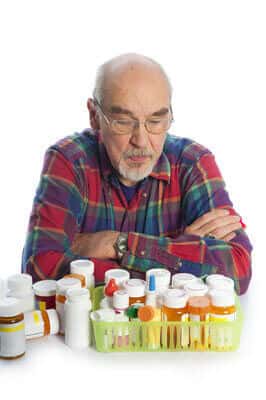
Decades ago Mom and Dad protected you from accidents and picked you up if you fell. Now it’s time for you to return the favor.
A fall can be life-threatening for an older person. A broken hip can lead to major surgery, nursing home confinement or lethal complications such as blood clots or pneumonia. Some experts estimate that up to half of the women who break a hip die within a year of the accident.
All sorts of things can lead to a fall, from ice on the sidewalk to a slippery bathtub. But the role of medications is often overlooked and under-appreciated.
Hundreds of commonly prescribed drugs can contribute to unsteadiness. Sleeping pills are especially likely to make someone woozy. Such a side effect might seem unimportant for a person who is lying down anyway. But older people often have to get up in the middle of the night to visit the bathroom, and a fall on the way could be disastrous.
OTC Pain Medicine
Even familiar over-the-counter pain medicines with diphenhydramine (Anacin P.M., Excedrin PM, Tylenol PM and Sominex Pain Relief Formula) could pose a problem. Not only might they have an effect of their own, but in combination with a blood pressure pill they could spell double trouble.
Many heart and blood pressure medications can make people feel lightheaded, especially on arising. Helen often felt dizzy from her blood pressure medicine. When she fell at home it changed her life. Although she did not break any bones, she injured muscles and tendons in her shoulder that hurt for months. Even more devastating, she lost her confidence, stopped driving, started using a walker and restricted her activities.
Heart Medicine
Vertigo may not seem like a life-threatening reaction, but if it leads to a fall and a fracture it can be deadly. Heart and blood pressure pills such as amiodarone, carvedilol, clonidine, doxazosin, metoprolol, nifedipine, sotalol and terazosin could make someone dizzy. No one should stop such medication on his own, but unsteadiness must be brought to the doctor’s attention.
Antidepressants & Anti-Anxiety Agents
When older people suffer the loss of family members and friends or have to face changes like moving out of their own homes, they may become anxious or depressed. Unfortunately, many of the drugs prescribed for these psychological conditions can make a person more susceptible to falls. Anti-anxiety agents such as diazepam or alprazolam and antidepressants like amitriptyline, bupropion, mirtazepine, paroxetine or venlafaxine could all pose hazards.
Prescription Pain Meds
Drugs used to control pain are another source of instability. Tramadol, OxyContin, Vicodin, piroxicam, topiramate, indomethacin, gabapentin and carbamazepine are just a few of the many medications that may contribute to a fall.
It may not be possible to eliminate an essential pain medicine or heart pill that causes dizziness. Safety proofing a home by removing slippery rugs and obstacles and providing grip bars in hallways and bathrooms can save a life.
Just as Mom and Dad kept you safe when you were little, now is the time for you to take steps to protect them from falls when they are most vulnerable. Here is a link to our Guide to Drugs and Older People. It lists other medications that increase the risk for falls as well as drugs that may cause confusion or memory problems.

